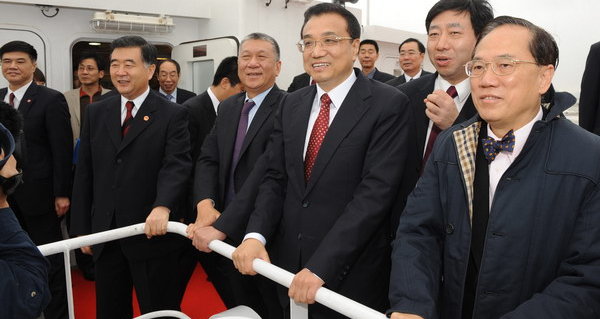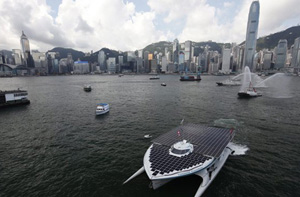Vice-Premier's visit to open more doors of opportunity
Updated: 2011-08-16 07:20
By Ding Qingfen and Joseph Li (China Daily)
|
|||||||||||
BEIJING - Vice-Premier Li Keqiang starts his three-day official visit to Hong Kong on Tuesday, a visit which officials and experts believe signals the central government's commitment to create more business and investment opportunities.
This is the first time Li has visited Hong Kong since he became vice-premier in 2008.
He is leading a big delegation, which includes heads of the nation's major ministries - Zhou Xiaochuan, governor of the People's Bank of China, Chen Deming, minister of commerce, and Zhang Ping, minister of the National Development and Reform Commission.
 |
|
Vice-Premier Li Keqiang (center) and senior officials from Guangdong, Macao and Hong Kong join an activity to mark the start of construction of the Hong Kong-Zhuhai-Macao Bridge in December 2009. [Huang Jingwen / Xinhua] |
"This is really a high-profile visit and a large-scale team which consists of many big names in China," said Chen Wenling, chief economist of the China Center for International Economic Exchanges and a senior expert on Hong Kong issues.
"All sides from Hong Kong are highly interested in Li's visit this time, and are filled with expectation."
An important part of Li's visit is attending Wednesday's forum on China's 12th Five-Year Plan (2011-2015) and the economic, trade and financial development between the Chinese mainland and Hong Kong, where he will make a keynote speech and clarify how the region could benefit from the country's implementation of the five-year plan.
Hong Kong is included for the first time in China's five-year plan. Premier Wen Jiabao said the central government will help improve Hong Kong's position as an international financial, shipping and trade center, including developing the region into an offshore yuan center, and promoting closer economic and trade cooperation between the mainland and Hong Kong.
Executive Councilor Cheng Yiu-tong, also a deputy to the National People's Congress, said Li's visit might bring good cheer to Hong Kong.
"It is a mutually beneficial five-year plan that will be crucial to future planning for both the mainland and Hong Kong. Since Li is in charge of economic affairs, he is the right person to speak about the national blueprint," Cheng said.
"And again, the visit of a State official shows the care and support of the central government."
Li's visit comes after Hong Kong announced last week that its economy shrank during the second quarter by 0.5 percent, the first time since 2009, as its exports grew at a slower pace. Hong Kong's export-led economy is likely to enter a year-long recession, said Kevin Lai, economist of Daiwa Capital Markets.
Professor Stephen Cheung, dean of Baptist University's School of Business, anticipated the forum would be the highlight of Li's visit.
"The five-year plan clearly opens up many business opportunities and areas of cooperation between the mainland and Hong Kong," Cheung said.
In 2003, Beijing and Hong Kong signed the Closer Economic Partnership Arrangement after the SARS epidemic had left Hong Kong in the doldrums. Hong Kong is the fifth largest trade partner for the Chinese mainland, and the largest source of the mainland's overseas direct investment. According to the Ministry of Commerce, Hong Kong contributes 45 percent of the mainland's accumulative overseas direct investment by volume.
According to an announcement by the Ministry of Commerce released on its website on Monday, Li will witness a ceremony for the release of yuan-denominated bonds, and the mainland and Hong Kong will also sign economic and trade cooperative agreements.
Hong Kong has long been regarded as a global financial center, together with London and New York. Cheung said Hong Kong's position as a financial center is irreplaceable.
Jonathan Choi, chairman of the Chinese General Chamber of Commerce, said he expects the issue of positioning of Hong Kong could be elaborated this time.
"The city will seize opportunities arising from the new five-year plan to develop into an offshore renminbi center and eye closer economic integration with the mainland," he said.
"Hong Kong still has the competitive edge, but it's critical for us to enhance our strengths as an international financial center."
|
Li's relations with HK Vice-Premier Li Keqiang's first visit to Hong Kong came in the 1980s in his capacity as director for the School Department of the Central Committee of the Communist Youth League and Secretary-General of the All-China Students Federation. In 1999, Li became the governor of Henan province. During his tenure he enjoyed close interaction with the Hong Kong business community. Between 2004 and 2007, while serving as Party secretary of Northeast China's Liaoning province, Li strengthened relations with the Hong Kong business community even further. He invited Hong Kong enterprises to participate in the renovation of old industrial bases in the northeast and restructuring State-owned enterprises. Subsequently, as a Standing Committee member of the Political Bureau of the Central Committee of the Communist Party of China and vice-premier, Li presided over the opening ceremony of the second line of the West-East Gas Transmission Line and the commencement of work on the Hong Kong-Zhuhai-Macao Bridge in 2009. |
- China's CNR delays $5b IPO after crash
- IT lags business growth at SOEs
- Chinese outbound M&As hit record levels
- Rate of sales' rise in decline
- Bright Food to buy Australian producer
- Ascent Solar to sell stake, eyes China growth
- Gas imports double in July as use surges
- CBRC seeks public opinion on new capital rules













